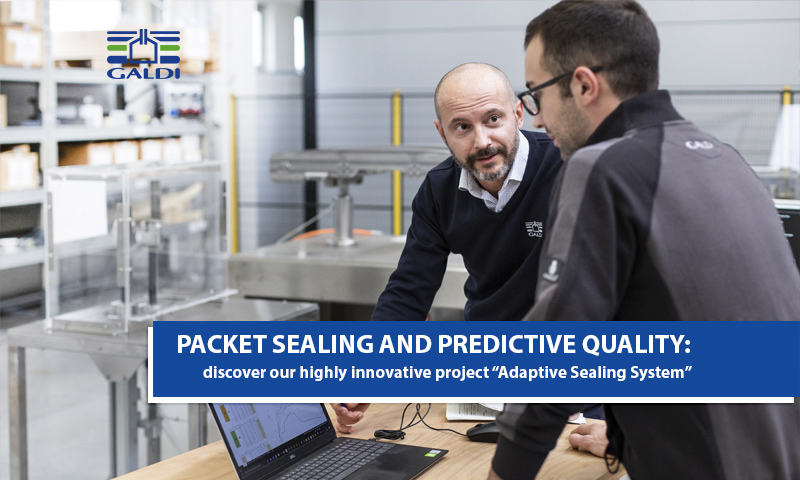Packet sealing and predictive quality: research and innovation
Thanks to virtual models and machine learning, we are revolutionising the sealing process for Gable Top cartons. Discover the Adaptive Sealing System project.

Packet sealing plays a crucial role in process reliability, product quality assurance and food safety.
In a market environment that demands ever increasing production reliability and the ability to work to tight deadlines, a sealing process with repeatable performance levels can reduce the risks related to food safety and allow for efficient and optimal production planning.
This is why Galdi started a highly innovative project called Adaptive Sealing System, which aims to optimise quality standards in the sealing process - for the Gable Top in particular.
From predictive quality to a real-time adaptive system
The research and development project started by Galdi is actually an exclusive, one-of-a-kind innovation in the world of food packaging machinery.
For the research part of the project, we relied on the support from specialists at the International School for Advanced Studies (SISSA) in Trieste and the University of Padua.
The project is progressing through 3 stages:
Phase 1:
The focus of the first - completed - stage was the implementation of predictive quality through the virtualisation of the sealing process, leveraging on the advancements made possible by Industry 4.0 technologies.
The goal of virtual simulations (Digital Twin) is to predict optimal set points to assess sealing quality before design engineers get to work and tests begin.
Collected data enable us to improve the accuracy of the design solutions we provide. This translates into:
Benefits for Galdi:
- Shorter product development cycle times, since we can test new packets, materials and designs without needing the actual machine to assess their feasibility.
Benefits for customers:
- More reliable packaging machines and greater guarantees in terms of performance repeatability
- Shorter time-to-market
- Shorter machine set-up times during installation
Phase 2:
During the second stage, data collected from the virtual models were used to train a machine learning model with the goal of predicting sealing quality in real time.
Compared with the virtual model, this solution generates a prediction in an infinitesimal time interval (1-2 milliseconds instead of several hours), effectively enabling the application of predictive quality to the packaging process.
Thanks to the immediacy provided by the machine learning model, we shall be able to develop an automatic reject kit for unsuitable packets, which will be installed on new machinery or - via an upgrade - on next generation packaging machines in the future.
This automated feature will allow for selective discarding of packets that are predicted to be of unacceptable quality.
This was also the research topic of the dissertation “Development of Machine Learning Models for Packet Quality Prediction in Industrial Machines” by Davide Frizzo (University of Padua), who developed some machine learning models in the course of his research work.
Phase 3:
The next stage will enable us to guarantee even better performance levels in terms of process robustness and repeatability, through an ongoing and adaptive control of the sealing system's operating conditions.
The system itself will then adapt its own parameters in real time. By adjusting to changing conditions, it will ensure:
- Excellent and consistent sealing quality
- Reduction of failure rates
- Reduction of rejects and waste
- Reduction of contamination risks
